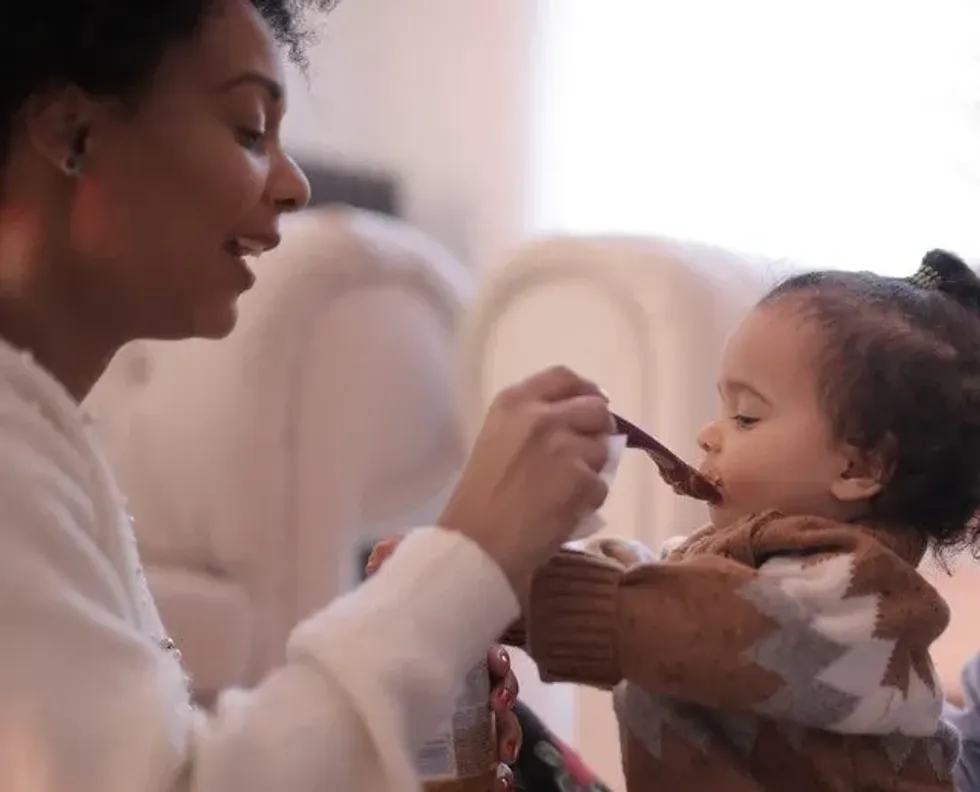It is a beautiful journey for parents to watch their baby growing up.
Each day brings a new task and a new milestone, and there may come a day when you start wondering if it is the right time to give your baby some solid foods! This can lead to some parents thinking about putting cereal in their baby's bottle.
Parents often seek detailed guidelines about feeding their babies, especially about how much to feed them at various stages during their first year of life.
According to the American Institute of Pediatrics, breastmilk or iron-fortified baby formula is able to meet the nutritional needs of a child up to six months of age. After this, you may be ready to introduce new foods.
Learn how and when to introduce rice cereal to your baby, as well as some other solid foods that you may think of feeding your infant here.
You can also check out our other articles written for parents about what to bring to a sleepover and when babies say mama and dada.
Why Can't You Put Cereal In Your Baby's Bottle?
The age-old advice to add cereal to your baby's bottle may seem pretty tempting to start. For a tired parent looking for a quick fix to get their child to sleep through the night, grandparents or family members might suggest adding cereal to a baby bottle.
However, the idea that feeding cereal in a bottle to your baby will help them sleep longer is a myth. In fact, adding cereal to a baby's bottle is a potentially harmful practice.
The American Academy of Pediatrics suggests that once a baby's digestive system is able to process cereal, they can eat it, but only ever with a spoon.
Taking advice from a doctor before starting to feed your baby cereal is also suggested. Below are a few reasons to avoid putting cereal into your baby's bottle.
Rice cereal is usually thicker than breast milk or formula. When we add rice cereal to a bottle and feed it to our baby, there is an increased risk of choking, gagging, or aspirating cereal into the lungs of infants who lack adequate swallowing reflexes.
It is important to introduce baby cereal at the right age and to gradually introduce your infant to different textures to improve this reflex as they grow.
Formula and breast milk also have a set number of calories per ounce, and when you add rice cereal to a bottle, those calories skyrocket. Bottle-feeding rice cereal to your baby can result in your baby consuming more calories than they require. As well as excessive weight gain, this overeating may also lead to constipation and stool inconsistency.
Putting rice cereal in a bottle can also delay your baby's learning of the ability to eat with a spoon. Many parents agree that sticking to spoon-feeding is the best way to start solids as this develops your baby's motor skills as they practice.
Adding cereal to your baby's bottle has no proven links to better sleep, even the Centers for Disease Control and Prevention (CDC) has acknowledged this. Instead, a bedtime routine started as early as two to four months of age is the best way to establish good sleep patterns for your infant.
When Can You Give Your Baby Solid Foods
One of your baby's first year's most exciting stages is introducing solid food. Breast milk is the best food recommended for your infant until they are six months of age (as suggested by the American Academy of Pediatrics) and, in the absence of breast milk, formula milk is the next best option for infants.
Parents should be aware that it may lead to food allergies if solids are started too early.
However, most babies can start consuming solid foods as a supplement to breast or formula-feeding by the age of four to six months.
At this age, babies usually have learned to avoid using their tongues to force food out of their mouths and have begun to learn the coordination needed to transfer solid food through the mouth for swallowing.
Feeding a one or three-month-old with cereal (in a bottle or even on a spoon) is not recommended, as a baby's delicate digestive system is not ready to manage solid foods before the fourth month.
To know if your baby is ready for rice cereal or solid foods, here are few signs parents can look out for:
When held up, your infant will keep her head up well.
Your baby is able to sit with support on a chair or lap.
Your baby is able to open her mouth wide enough to be able to take food from a spoon.
Your baby shows interest in table foods, perhaps by staring at you when you are eating or trying to grab a fork from your hand.
If you are still wondering 'When will I start putting cereal in my baby's bottle?' we must remind parents that feeding your baby rice cereal from a bottle is not recommended.
Though parents might be tempted to jump to adding cereal to their infant's diet at an early age, it is vital to know that your baby's digestive system is ready before you do so, and consulting a pediatrician is always suggested.
What Kind Of Cereal Can I Spoon Feed My Baby?
Even after six months of age, along with solid food, parents should continue feeding their baby with breast milk or formula to boost their baby's long-term health. Although it should never be given in a bottle, rice cereal for babies is one of the best solid foods to start with.
Baby oatmeal, or barley, is also an easy and fast training food. This is why they are often recommended as a baby's first food.
Parents can add breast milk or formula to the rice cereal to make it thicker and once your child gets used to baby cereal, you can start introducing other foods like sweet potato, beans, avocado, pears, apple, banana, mashed eggs, and other fruits and vegetables with no sugar or salt.
In the second half of your child's first year, iron and zinc are crucial nutrients. Pureed meats and iron-fortified single-grain cereals are high in these nutrients. If your child has been breastfed, talking to your pediatrician about beginning solids with pureed meat is advised.
Your baby may start having three small meals a day, two snack times, and still continue breastfeeding by eight to nine months of age. Giving proper food with a range of nutrients is crucial for the growth and health of your baby.
It is important to remember that solid food introduction takes time, and each baby learns at his or her own pace. Babies are more likely to imitate adults who eat well and enjoy it.

Starting with a single-grain iron-fortified baby cereal is best, and rice cereal has long been considered a baby's first meal. Here are some general recommendations for weaning your child onto solid foods:
Use a small baby spoon to feed your infant. Allow plenty of time for mealtimes for both yourself and your baby.
To begin with, add one teaspoon of dry baby cereal to two to three tablespoons of breast milk or formula. Make it as light as possible. You can make it thicker as the baby gets older.
Initially, between a half and one whole spoonful of rice cereal will suffice, it can slowly be introduced as one meal in a day. Gradually parents can move to two meals of rice cereal over the next few days.
Before moving on to another food item, give the last one at least three days to settle in. Other foods, such as puréed fruits and vegetables, beans, lentils, or yogurt, are to be introduced once your baby has gotten the hang of eating the previous one.
Bear in mind that happy, alert babies are more likely to open wide for an incoming spoon. Ensure that your baby is not cranky or sleepy and is in a good mood before feeding them cereal.
Since rice cereal's taste and texture are unfamiliar to babies, they often refuse their first servings. In this case, you can breastfeed your baby or give her formula again for a week and then reintroduce the rice cereal.
If the issue persists, you can take advice from your doctor to ensure that the resistance isn't a symptom of anything more serious.

What To Avoid
As previously mentioned, parents should not feed their baby rice cereal in a bottle. This should be avoided and any baby cereal must be fed using a spoon.
Although food allergies are pretty normal in infants, some children outgrow them by the age of five. Introducing foods one after the other and leaving a three-day gap between each be item, can help to detect any allergies.
Food reactions in babies can range from gassiness, diarrhea, or stool mucus to vomiting and rashes. Parents should be aware of this throughout the weaning process.
Honey, cow milk, and fruit juices are just a few food items that should only be introduced after the baby's first birthday. Avoid choking hazards like hard foods that are difficult to gum, raw fruits, nuts, popcorn, and slippery foods that haven't been cut up, such as grapes and cherry tomatoes.
It is always good to serve your baby soft food items that are mashed up or pureed. For a small child who is just starting to get excited about even the mildest pureed squash, every new taste is an adventure for them.
As a parent and a family, your hard work now is laying the groundwork for a lifetime of good eating habits.
If you found this article helpful, then why not take a look at when do babies smile or planning a baby shower for daddy?










